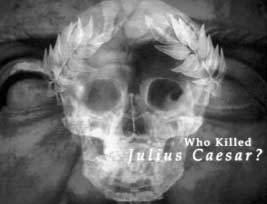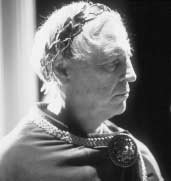-
Informed Consent &
Malpractice -
Employment Litigation
ADA - Disability - Sexual Misconduct
Discrimination - Worker's Compensation -
Emotional &
Physical Damages
Conscious Pain & Suffering
Post-Traumatic Stress Disorder (PTSD)
Neuropsychiatric Autopsy - Standards for Experts
-
Product Liability
Medical Devices & Pharmaceuticals
Toxic Tort -
Criminal Justice &
Public Safety
Diminished Capacity - Drug Addiction
Competency to Confess
Death Penalty Mitigation
Workplace Safety - Family & Custody Issues
-
Testamentary &
Contractual Capacity -
Professional &
Organizational Ethics
Patient Care - Managed Care - Privacy -
Psychoanalysis &
Cultural Perspectives -
Loading
Who Killed Julius Caesar?
Psychoforensic Analysis of Decisionmaking Under Stress
The American Psychoanalyst, November 2003
Harold J. Bursztajn

Psychoanalysis has had a long tradition of informing psychohistorical inquiry. Forensic neuropsychiatry has experienced a rebirth and resuregence of interest in the courtroom.
Two somewhat pioneering applications of psychoanalysis—psychoanalytically informed decision analysis and psychoanalystically informed neuropsychiatry—can deepen understanding of such phenomena as leadership, political decisionmaking, and courtroom processes. Given the chasm between private and public settings, this may seem paradoxical.
Psychoanalytically informed decision analysis modifies the assumption of traditional decision analysis—that under conditions of uncertainty, humans choose based on rational self-interest—with the psychoanalytic perspective that "rational" and "irrational" in a given context may not be obvious, commonsensical, or universal. I use the term "psychoanalytically informed neuropsychiatry" to refer to similar applications of psychoanalysis to reconsider "closed" questions reopened by advances in modern neurobiology.
I was born in Poland just after World War II. As a child strolling with my father in Lodz I saw strangers rush up to thank him once again for saving their lives as a leader of the Shoah resistance. Thus early on I was inspired by the wonder of leadership and decisionmaking in times of uncertainty, conflict, and crisis.
As an undergraduate of Princeton, I was introduced to the work of Freud by historian Carl Scherske and to the emerging discipline of neurobiology by several pioneers in that field. After graduating in 1972, I entered Harvard Medical School. There I was introduced to the work of Amos Tversky and Danny Kahneman on the heuristics of judgment and decisionmaking under conditions of uncertainty. (Kahneman, a psychologist, last year received the Nobel Prize in economics).
Psychoanalysis and the cognitive psychology of social judgment and decisionmaking prima facie are complementary approaches. Each recognizes that human beings regularly make choices that might no be rational from a decision-analytic standpoint. People who make unwise or unproductive decisions are not necessarily stupid, uninformed, or neurotic. Rather, they are applying strategies shaped by the evolution of the mind, culture, personal history, and circumstance.
It seemed natural to integrate both psychoanalysis and the study of decisionmaking heuristics into my clinical and consulting practice, as well as into my teaching and research. I also wanted to make these methods accessible to a wider public. To that end, I have worked with talented documentary producers and directors on historical investigations, serving in a variety of roles ranging from confidential advisor to on-screen, psychodynamically informed decision analyst.
As a working psychoanalyst, I exercise curiosity in the most private of settings about an analysand's received truths and accepted "absolute" wisdom, to help free the analys and to ask previously unthinkable or unspeakable questions. As a forensic psychiatrist, I work in interdisciplinary settings exploring the validity of potential translations between the clinical world of meaning and the legal world of objectivity, to understand the choices people make under conditions of uncertainty, conflict, ambiguity, or adversity.
Although much of my work has been as a confidential off-screen advisor, the following example of some on-screen work illustrates how a psychoanalytically trained forensic psychiatrist can further public education by working with the media.
NEW PERSPECTIVE ON OLD DECISIONS

After I had served as an on-screen forensic psychiatric analyst for Anthony Geffen's London-based Atlantic Productions on a program for the Discovery Channel, "The Assassination of King Tut," Ruth Sessions of the same production company approached me with an intriguing request: Could I participate in their investigation to help a TV audience understand how and why Julius Caesar was killed? Our findings would be telecast in the documentary (also for Discovery)"Who Killed Julius Caesar?" The team included internationally distinguished forensic investigator Luciano Garofano of Italy's carabinieri and several highly talented classical historians.
What made this project particularly satisfying was that everyone was open to my developing and exploring with them questions that had been overlooked by many historians. For example, did Julius Caesar, a genius and perhaps history's greatest military tactician, a general who never lost a battle, really walk blindly into a trap? He had access to high levels of intelligence. He had a warning note clutched in his hand at the time of his death. Why did he dismiss his bodyguard shortly before his murder? How could such a wellinformed man come to be killed in front of hundreds of witnesses at a senate gathering?
Garofano also welcomed the opportunity to explore questions regarding Caesar's physical and mental condition.Why was his behavior so strange in the weeks leading up to his death? Could Caesar's epilepsy, well documented in ancient texts, have affected his behavior and led to his death?
We contemplated an instance of Caesar's strange behavior when he failed to rise to greet the senate—a deep insult to that body— a few weeks before his death. One early historical analysis gave the excuse of diarrhea; another, epilepsy. Considering other details in available descriptions of his behavior, the question as to whether Caesar's choices were influenced by temporal lobe epilepsy seemed well wor th exploring. Symptoms of temporal lobe epilepsy, which become more common as the seizures progress and become more generalized, include increased dissociation and incontinence of bladder and bowel. Might Caesar, driven by narcissistic concern with his own image and dignity, who had risen to become the most powerful man in his world (and who could easily be said to have suffered from grandiosity), have found it deeply humiliating, frightening, and frustrating to lose control of both his sense of continuity in space and time and his body in public? It is reasonable to infer that for Caesar, it was far more painful to be seen as pitiable and incontinent than haughty and rude. It is not a stretch to imagine that the life choice he faced was especially stark: old age and increasing fits, temporal lobe–influenced loss of autobiographical memory that he so valued, and even public diarrhea, versus a dramatic exit.
I next raised the question whether Caesar's dramatic exit was not simply a narcissist's suicide, but also a consciously chosen strategic act designed to ensure his succession. Cornell University professor Barry Strauss, of our classical historians team, explained that Caesar effectively gave the conspirators a deadline when he announced he was about to leave for war in Persia. Garofano noted that Caesar changed his will to name his successor, his nephew Octavius, six months before his death. Just before his death, Caesar left every citizen enough money to live on for three months, guaranteeing a groundswell of mourning and adulation and the historical immortality of a famous death that he so craved in writing about his life.
ET TU, JULIUS?
While we worked to educate the public, we also were able to pose a previously overlooked question in Julius Caesar scholarship. In the words of the London Sunday Times Magazine cover article on the investigation, "Et Tu, Julius?" (March 9, 2003):
Bursztajn's [working hypothesis] is startling. [What if] the godfather who directs and controls the events of March 15, 44 BC, is not hot-headed Cassius or scheming Brutus[?] They are, as they always have been, far out of their depth, minnows in a political ocean patrolled by sharks. No: the man pulling the strings, the orchestrator of his own death, [could be] none other than Julius Caesar himself. The outcome is exactly as he had planned it. In every particular, he gets what he wants. The naive and foolish conspirators, on the other hand, go away empty-handed, beaten by superior tradecraft and the poverty of their own imagination. In defending the republic they ensured its demise. In fighting dictatorship they have guaranteed its victory. By killing Caesar they have made him immortal.
In this exploration I used psychoanalytically informed decision analysis and forensic neuropsychiatry as ways to open other paths of inquiry, rather than to come to a definitive conclusion. Such analyses are not to be confused with a formulated forensic psychiatric opinion, as is offered in the courtroom, or a psychoanalytic interpretation, as is constructed with a patient in the consulting room. But by drawing from each, one is able to question received wisdom, creating a context of discovery in which new hypotheses can be explored while continuing to acknowledge the ubiquity of both intrapsychic and interpersonal conflict.


